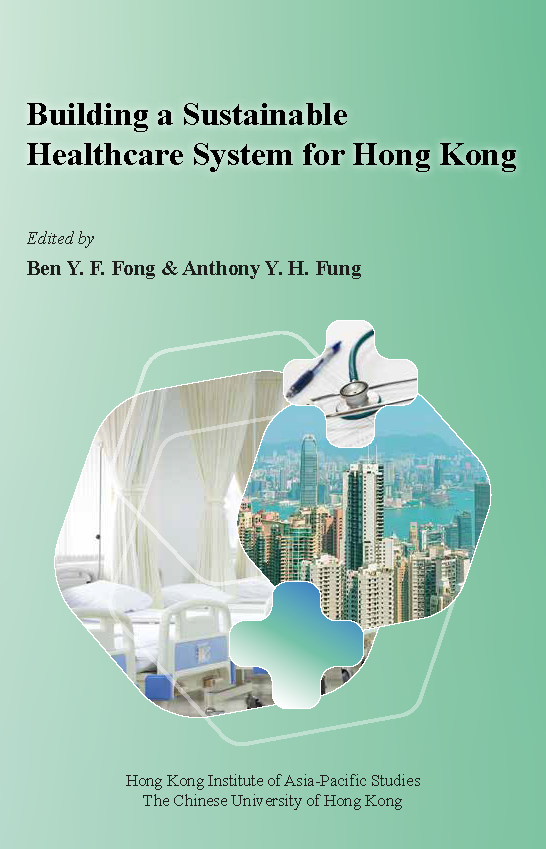
|
| Research Highlights |
|
Building a Sustainable Healthcare System for Hong Kong
by Anthony Y. H. Fung* and Ben Y. F. Fong |
|
 In the context of the revamp of the Food and Health Bureau to the Health Bureau, which is now focusing on medical and health policies, the Hong Kong Institute of Asia-Pacific Studies of The Chinese University of Hong Kong organized a Policy Forum on Building a Sustainable Healthcare System for Hong Kong on 28 and 29 July 2023 to arouse the interest of academics and professionals from and outside the healthcare sector in the provision of healthcare in Hong Kong. Following the forum, a new book titled Building a Sustainable Healthcare System for Hong Kong has been recently published to strengthen the knowledgebase and ideas for building a sustainable healthcare system for Hong Kong.
In the context of the revamp of the Food and Health Bureau to the Health Bureau, which is now focusing on medical and health policies, the Hong Kong Institute of Asia-Pacific Studies of The Chinese University of Hong Kong organized a Policy Forum on Building a Sustainable Healthcare System for Hong Kong on 28 and 29 July 2023 to arouse the interest of academics and professionals from and outside the healthcare sector in the provision of healthcare in Hong Kong. Following the forum, a new book titled Building a Sustainable Healthcare System for Hong Kong has been recently published to strengthen the knowledgebase and ideas for building a sustainable healthcare system for Hong Kong.
Healthcare systems in Hong Kong are complex networks characterized by dynamic interactions among organizational structures, specific tasks, technologies, and professionals within physical, artificial, social, and cultural environments, while also adapting to unpredictable external influences. To examine the current situation, this book is contributed by 24 academics and professionals and consists of 11 chapters organized under three headings: Systems Review, Public Health Crisis, and Sustainable and Caring Services. The first part of the book focuses on examining healthcare challenges and evaluating the effectiveness of the new policy on implementing the District Health Centres (DHCs) model in Hong Kong. Over the past decade, the healthcare system has been facing significant challenges, including a rising demand for healthcare services from the community, an increasingly ageing population, a shortage of healthcare workers, and other problems. These difficulties have been particularly pronounced during the COVID-19 pandemic. To address these challenges, DHCs and expresses have been established in all 18 districts since September 2019. The authors of part 1 advocate for this holistic health model focusing on societal influences and shared health responsibility. They propose enhancing healthcare through staff training, specialized nursing, policy-driven financing, and collaborative efforts between medical and social spheres to effectively tackle health disparities. Part 2 emphasizes the importance of demonstrating a successful and sustainable healthcare model in Hong Kong. Critical health issues such as the SARS and COVID-19 pandemics are discussed as illustrative cases. The authors evaluate the local healthcare system’s strategic response to the COVID-19 pandemic, aiming for a comprehensive understanding of a successful and sustainable healthcare model in Hong Kong. They suggest possible reforms for the future by creating evidence-based models of disaster policies that involve collaboration with health professionals, policymakers, urban planners, and all stakeholders to ensure effective crisis management. The final section discusses two innovative approaches to enhance sustainability within the healthcare system. Research has linked high red meat consumption in Hong Kong to various illnesses including cancers, cardiovascular diseases, and diabetes. As a remedy, the authors propose reducing red meat intake and increasing vegetable consumption to prevent premature deaths and lower the burden on the healthcare system. Another proposed solution involves leveraging blockchain applications to advance sustainability across environmental, economic, and social dimensions within Hong Kong’s healthcare sector. By examining global applications, the authors explore blockchain’s potential to bolster sustainability efforts. In addition to these approaches, current limitations of the healthcare system are mentioned. The authors point out that the Elderly Health Care Voucher Scheme faces challenges due to inadequate health literacy, financial barriers, and a lack of oversight. Furthermore, the concept of compassionate care has been largely neglected academically and in practice and hence the authors encourage the local compassionate care practices. To conclude, this book explores the challenges of the healthcare system, the impacts of globalised pandemics and offer suggestions for further reform and improvement, hoping that Hong Kong will build a sustainable healthcare system in the future. | |
